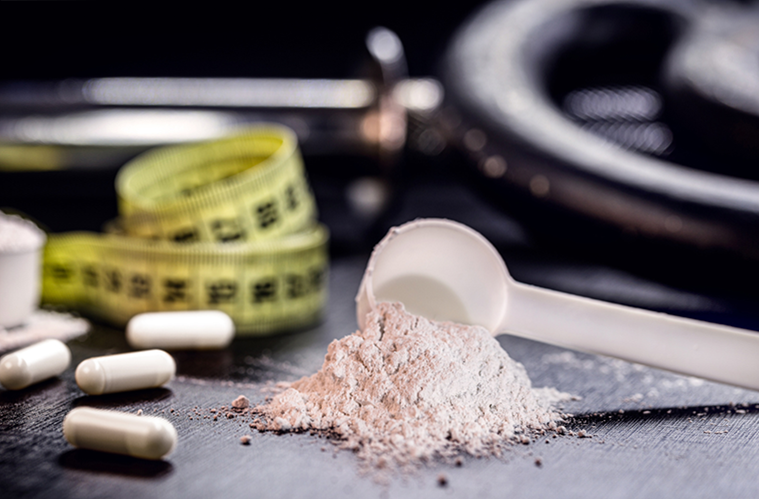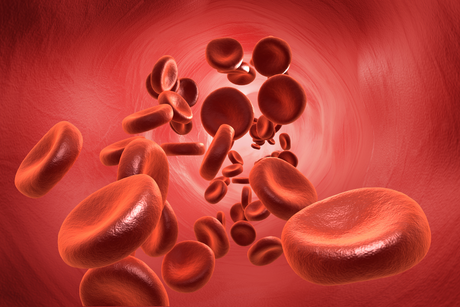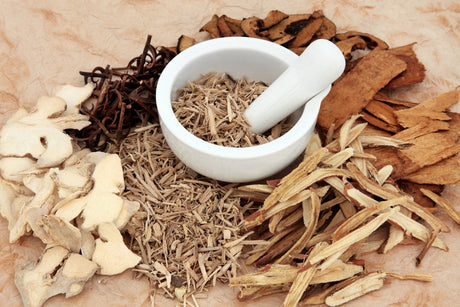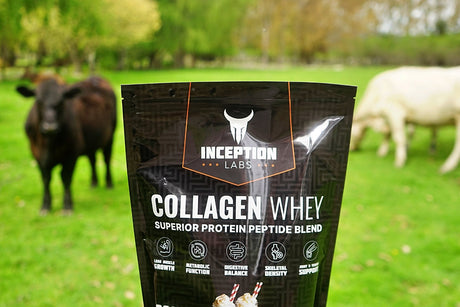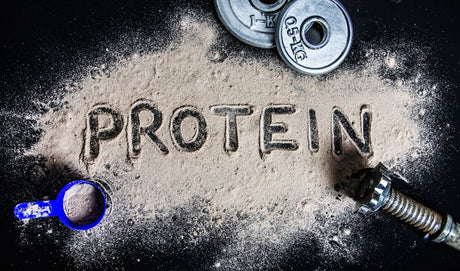L-carnitine, an amino acid that the body can synthesise (from the amino acids lysine and methionine), is estimated to derive approximately 75% of its stores in the body from dietary intake (Vaz & Wanders, 2002). This fact underlines the importance of prioritising dietary intake of this nutrient. Although L-carnitine is not technically an essential amino acid - since the body can produce it to some degree, it is considered a conditionally essential amino acid. Under certain circumstances, the body may not produce enough of it, making supplementation particularly beneficial.
The primary role of L-carnitine in the body is to transport fatty acids from the cytosol of the cell across the inner and outer mitochondrial membranes. Here, they can be broken down into ATP for energy via beta-oxidation.
Triglycerides can be metabolised to produce fatty acids. These fatty acids can then be directly utilised by the mitochondria for energy production at a cellular level via a process called beta-oxidation. However, for these fatty acids to enter the mitochondria, they must first cross the mitochondrial membrane. This is where L-carnitine comes into play.
L-carnitine acts as a shuttle that carries these fatty acids across the inner membrane and into the mitochondria so that they can be metabolised and used for energy. This metabolic pathway, beta-oxidation, is a specific type of aerobic respiration. This form of cellular respiration is used by your body throughout the day, as well as during low to moderate intensity exercise. Aerobic respiration can only occur in the presence of oxygen, which means it can only happen when your respiratory system supplies your body's cells with enough oxygen to carry out the cellular pathway.
Although L-carnitine is exclusively utilised for beta-oxidation to improve aerobic respiration, it also enhances anaerobic and creatine phosphate cellular respiration.
L-carnitine is believed to primarily function by increasing energy output at a cellular level. In a meta-analysis (Vecchio, Chiaramonte, Testa, & Pavone, 2021), researchers noted that L-Carnitine plays a central role in enhancing endurance and recovery from fatigue. The beneficial effects of both acute and chronic L-carnitine supplementation in several pathological conditions, such as infectious diseases, comorbidities, dialysis, cancer, and dystonia, are well-documented. Its intake has beneficial effects on healthy subjects too. In the elderly, it reduces the sensation of fatigue and improves physical, mental, and cognitive function.
Benefits to athletic performance
In athletes, L-carnitine facilitates recovery, increases blood flow, and enhances oxygen supply to muscle tissue. Additionally, it alleviates muscle injury, reduces markers of cellular damage, and decreases free radical formation. While this study was primarily concerned with the effects of L-carnitine on specific clinical conditions, it did note that L-carnitine also appears to be a promising molecule for improving athletic performance in youth.
Several clinical trials demonstrated that L-carnitine can improve athletic performance in young, healthy adults. This further underscores the potential of L-carnitine as a supplement for enhancing physical performance and overall health.
Increased Bloodflow
In one study (Vecchiet, et al., 1990), researchers concluded that treatment with L-carnitine significantly increased both maximal oxygen uptake and power output. Furthermore, carbon dioxide production, pulmonary ventilation, and plasma lactate were reduced at similar exercise intensities in the L-Carnitine trial. The researchers concluded that pre-treatment with L-carnitine favoured aerobic processes under these experimental conditions, resulting in more efficient performance. It's worth noting that this study specifically reported improvements in aerobic performance, typically associated with low to moderate intensity exercise, often considered cardio.
Enhanced aerobic & anaerobic respiratory performance
Interestingly, other studies have shown that L-carnitine can also enhance anaerobic performance. For instance, in one study (Koozehchian, et al., 2018), researchers found significant increases in bench press lifting volume at weeks 6 and 9 with L-Carnitine supplementation. A similar trend was observed with leg press in the L-Carnitine group. By week 9, there were significant increases in mean power and peak power, a reduction in post-exercise blood lactate levels, and beneficial changes to total antioxidant capacity. The researchers concluded that L-carnitine supplementation enhances exercise performance while attenuating blood lactate and oxidative stress responses to resistance training.
Not only does L-carnitine appear to improve aerobic respiration, which is expected given its primary physiological role in beta-oxidation, but it also seems to potently improve anaerobic respiration and performance as well. This dual functionality makes L-carnitine a promising supplement for enhancing both aerobic and anaerobic performance.
The question of why L-carnitine has such a profound impact on performance can be answered by looking at a study where researchers concluded that muscle carnitine content can be increased in humans through dietary means (Wall, et al., 2011). More importantly, they found that L-carnitine plays a dual role in skeletal muscle fuel metabolism that is dependent on exercise intensity.
Specifically, increasing muscle carnitine content spares muscle glycogen during low-intensity exercise, which is consistent with an increase in muscle lipid utilisation. However, during high-intensity training, it results in a better matching of glycolytic, pyruvate dehydrogenase complex (PDC), and mitochondrial flux, thereby reducing muscle anaerobic ATP production.
In simpler terms, L-carnitine is so effective at improving aerobic respiration at a cellular level that it reduces the demands placed on the anaerobic system to produce ATP. This is beneficial because anaerobic respiration is often considered a less efficient form of cellular respiration due to the production of lactate as a byproduct. When lactate accumulates in muscle tissue, it increases the acidity of the tissue and can eventually inhibit muscle contraction. This is not an issue with aerobic respiration, which is why one can maintain a slow pace for a long time. However, during high-intensity activities like a maximum sprint or weightlifting, lactate produced via the anaerobic cellular pathway can quickly lead to fatigue.
What appears to be happening is that L-carnitine improves the body's ability to produce ATP via the aerobic respiration cellular pathway, thereby enhancing both aerobic and anaerobic performance. As a result, L-carnitine also appears to reduce exercise-induced inflammation (Haghighatdoost, Jabbari, & Hariri, 2019), decrease exercise-induced muscle damage (Volek, et al., 2002), lower exercise-induced oxidative stress (Koozehchian, et al., 2018), and decrease muscle soreness (Giamberardino, et al., 1996). What's particularly interesting is that these effects not only lead to an increase in performance over time but also appear to lead to a decrease in fat mass and an increase in muscle tissue accumulation over time (Wutzke & Lorenz, 2004).
Enhanced cognitive performance
Not only does L-carnitine appear to enhance physical performance, but it also seems to improve cognitive performance. In a remarkable study, researchers concluded that pooled data across nine randomised controlled trials (Veronese, et al., 2017) showed that L-Carnitine significantly reduced depressive symptoms. In three randomised controlled trials comparing L-Carnitine versus antidepressants, L-Carnitine demonstrated similar effectiveness in reducing depressive symptoms. Moreover, the incidence of side effects was significantly lower in the L-carnitine group than in the antidepressant group. Subgroup analysis suggested that L-carnitine was most efficacious in older adults. L-carnitine supplementation significantly decreased depressive symptoms compared to placebo, offering comparable effects to established antidepressant agents with fewer side effects.
Reduces age-related cognitive decline
L-carnitine appears to be especially beneficial for populations dealing with age-related cognitive issues. This discovery has been confirmed in several trials that have investigated the effects of L-carnitine on Alzheimer's disease (Rai, et al., 1990) and general cognitive decline (Passeri, et al., 1988), all of which found positive effects. However, the cognitive benefits of supplementing with L-carnitine are not just specific to the aging population. Several clinical trials have shown the benefits of L-carnitine supplementation in youth dealing with symptoms of ADHD (Van Oudheusden & Scholte, 2002).
The mechanisms of action here are twofold. The first is L-carnitine's ability to improve ATP production at a cellular level (Ori, Freo, Pizzolato, & Dam, 2002), thereby allowing neural cells to be more efficient at producing energy, leading to improvements in cognitive function.
The second mechanism of action appears to be that L-carnitine can increase specific neurotransmitters in certain brain regions responsible for memory, attention, and cognition (Villa, Ferrari, & Gorini, 2011). Specifically, L-carnitine has been shown to increase serotonin, GABA, and adrenaline levels. Low levels of these hormones have been linked to cognitive and mood issues. Therefore, by L-Carnitine being able to at least maintain the level of these neurotransmitters in key brain regions, it appears to improve attention, memory, and mood.
Improved testicular function
The last benefit of L-carnitine that I want to delve into, is its ability to improve testicular function.
Maintains testosterone levels in times of stress
While there is little evidence that L-carnitine can increase testosterone levels, some evidence suggests that it can maintain testosterone levels in instances of stress (Bidzinska, et al., 1993). Even in men experiencing age-related drops in testosterone, L-carnitine does not appear to improve testosterone levels. However, it does seem to improve mood, reduce fatigue, and decrease sexual dysfunction associated with low testosterone (Cavallini, Caracciolo, Vitali, Modenini, & Biagiotti, 2004).
Improves fertility markers
Where L-carnitine truly excels is in its potent ability to improve fertility markers (Lenzi, et al., 2003). In fact, L-carnitine is one of the most consistently researched natural compounds shown to improve several different fertility markers, making it an excellent option for individuals looking to improve fertility for the purposes of conception.
Increased responsiveness to testosterone
In addition to its ability to maintain testosterone levels in the face of stress and improve fertility markers, L-carnitine also appears to increase the level and density of androgen receptors on muscle tissue (Kraemer, et al., 2006). So, even though it doesn't increase testosterone per se, it does appear to increase the responsiveness to testosterone. This might be one of the mechanisms by which it improves physical performance, recovery, muscle retention, and fat burning.
Improved health markers.
Aside from its benefits to physical performance, cognitive performance, and testicular function, L-Carnitine also appears to be potent at improving markers of liver function (Tajiri, et al., 2018), blood pressure (Askarpour, et al., 2019), blood glucose control (Fathizadeh, Milajerdi, Reiner, Kolahdooz, & Asemi, 2019), blood lipids (Bloomer, Tschume, & Smith, 2009), oxidative stress (Cao, et al., 2011), and inflammation (Derosa, et al., 2011).
In summary, L-Carnitine proves to be a multifaceted supplement, extending its benefits beyond physical enhancements. With demonstrated positive effects on cognitive performance and mood, it becomes a valuable asset for individuals of all ages. Its role in fertility improvement, particularly in enhancing testicular function, adds to its significance. While not directly impacting testosterone levels, L-Carnitine boosts responsiveness to testosterone, aiding in physical performance, recovery, muscle retention, and fat burning. The wide-ranging health benefits, from liver function to inflammation reduction, highlight L-Carnitine's potential as a comprehensive performance enhancer and overall health supplement.
Product Spotlight
MuscleSport CarniShred™ combines two forms of L-Carnitine, proven by research to aid in breaking down fats and producing energy. It also includes unique patented ingredients that boost metabolism and create a perfect synergy to help you burn body fat, amplify cellular energy, and recover quicker from exercise-induced muscle damage.
References
Askarpour, M., Hadi, A., Bozorg, A., Sadeghi, O., Sheikhi, O., Sheikhi, A., & Kazemi, M. (2019). Effects of L-carnitine supplementation on blood pressure: a systematic review and meta-analysis of randomized controller trails. journal of human hypertension, 33, 725-734.
Bidzinska, B., Petraglia, F., Angioni, S., Genazzani, A. D., Criscuolo, M., Ficarra, G., . . . Genazzani, A. R. (1993, Jun). Effect of different chronic intermittent stressors and acetyl-l-carnitine on hypothalamic beta-endorphin and GnRH and on plasma tesosterone levels in male rats. Neuroendocrinology, 57(6), 985-90. doi:10.1159/000126489
Bloomer, R. J., Tschume, L. C., & Smith, W. A. (2009, May). Glycine propionyl-L-carnitine modulates lipid peroxidation and nitric oxide in human subjects. Int J Viam Nutr Res, 79(3), 131-41. doi:10.1024/0300-9831.79.3.131
Cao, Y., Qu, H.-J., Li, P., Wang, C.-B., Wang, L.-X., & Han, Z.-W. (2011, Jul). Sing dose administration of L-carnitine improves antioxidant activities in healthy subjects. Tohoku J Exp Med, 224(3), 209-13. doi:10.1620/tjem.224.209
Cavallini, G., Caracciolo, S., Vitali, G., Modenini, F., & Biagiotti, G. (2004, Apr). Carnitine versus androgen administration in the treatment of sexual dysfunction, depressed mood, and fatigue associated with male aging. Urology, 63(4), 641-6. doi:10.1016/j.urology.2003.11.007
Derosa, G., Maffioli, P., Ferrari, I., D'Angelo, A., Fogari, E., Palumbo, I., . . . Cicero, A. F. (2011, Oct). Comparison between orlistat plus l-carnitine and orlistat alone on inflammation parameters in obese diabetic patients. Fundam Clin Pharmacol, 25(5), 642-51. doi:10.111/j.1472-8206.2010.00888.x
Fathizadeh, H., Milajerdi, A., Reiner, Z., Kolahdooz, F., & Asemi, Z. (2019, Aug 19). The effects of L-carnitine supplementation on glycemic control: a systematic review and meta-analysis of randomized controlled trails. EXCLI J, 19, 631-643. doi:10.17179/excli2019-1447
Giamberardino, M. A., Dragani, L., Valente, R., Di Lisa, F., Saggini, R., & Vecchiet, L. (1996, Jul). Effects of prolonged L-carnitine administration on delayed muscle pain and CK release after eccentric effort. Int J Sports Med, 17(5), 320-4. doi:10.1055/s-2007-972854
Haghighatdoost, F., Jabbari, M., & Hariri, M. (2019, Aug). The effect of L-carnitine on inflammatory mediators: a systematic review and meta-analysis of randomized clinical trails. Eur J Clin Parmacol, 75(8), 1037-1046. doi:10.1007/s00228-019-02666-5
Koozehchian, M. S., Daneshfar, A., Fallah, E., Agha-Alinejad, H., Samadi, M., Kaviani, M., . . . Kreider, R. B. (2018, Dec 31). Effects of nine weeks L-Carnitine supplementation on exercise performance, anaerobic power, and exercise-induced oxidative stress in resistance-trained males. J Exerc Nutrition Biochem, 22(4), 7-19. doi:10.20463/jenb.2018.0026
Kraemer, W. J., Spiering, B. A., Volek, J. S., Ratamess, N. A., Sharman, M. J., Rubin, M. R., . . . Maresh, C. M. (2006, Jul). Androgenic responses to resistance exercise: effects of feeding and L-carnitine. Med Sci Sports Exerc, 38(7), 1288-96. doi:10.1249/01.mss.0000227314.85728.35
Lenzi, A., Lobardo, F., Sgro, P., Salacone, P., Caponecchia, L., Dondero, F., & Gandini, L. (2003, Feb). Use of carnitine therapy in selected cases of male factor infertility: a double-blind crossover trail. Fertil Steril, 79(2), 292-300. doi:10.1016/s0015-0282(02)04679-4
Ori, C., Freo, U., Pizzolato, G., & Dam, M. (2002, Ocy 4). Effects of acetyl-L-carnitine on regional cerebral glucose metabolism in awake rats. Brain Res, 951(2), 330-5. doi:10.1016/s0006-8993(02)03290-0
Passeri, M., Iannuccelli, M., Ciotti, G., Bonati, P. A., Nolfe, G., & Cucinotta, D. (1988). Mental impairment in aging: selection of patients, methods of evulation and therapeutic possibilities of acetyl-L-carnitine. Int J Clin Parmacol Res, 8(5), 367-76.
Rai, G., Wright, G., Scott, L., Beston, B., Rest, J., & Exton-Smith, A. N. (1990). Double-blind, placebo controlled study of acetyl-l-carnitine in patients with Alzheimer's dementia. Curr Med Res Opin, 11(10), 638-47. doi:10.1185/03007999009112690
Tajiri, K., Futsukaichi, Y., Kobayashi, S., Yasumura, S., Takahara, T., Minemura, M., & Sugiyama, T. (2018). L-Carnitine for the Treatment of Overt Hepatic Encepphalopathy in Patients with Advanced Liver Cirrhosis. J Nutr Vitaminol (Tokyo), 64(5), 321-328. doi:10.3177/jnsv.64.321
Van Oudheusden, L. J., & Scholte, H. R. (2002, Jul). Efficacy of carnitine in the treatment of children with attention-deficit hyperactivity disorder. Prostaglandins Leukot Essent Fatty Acids, 67(1), 33-8. doi:10.1054/plef.2002.0378
Vaz, F. M., & Wanders, R. J. (2002, Feb 1). Carnitine biosynthesis in mammals. Biochem J, 361(Pt 3), 417-29. doi:10.1042/0264-6021:3610417 Vecchiet, L., Di Lisa, F., Pieralisi, G., Ripari, P., Menabo, R., Giamberardino, M. A., & Siliprandi, N. (1990). Influence of L-carnitine administration on maximal physical exercise. Eur J Appl Physiol, 61, 486-490.
Vecchio, M., Chiaramonte, R., Testa, G., & Pavone, V. (2021). Clinical Effects of L-Carnitine Supplementation on Physical Performance in Healthy Subjects, the Key to Success in Rehabilitation: A Systematic Review and Meta-Analysis from the Rehabilitation Point of View. J Funct. Morphol. Kinesoil., 6(4), 93. doi:10.3390/jfmk6040093
Veronese, N., Stubbs, B., Solmi, M., Ajnakina, O., Carvalho, A. F., & Maggi, S. (2017, September 11). Acetyl-L-carnitine Supplementation and the Treatment for Depressive Symptoms: A Systematic Review and Meta-analysis. Psychosomatic Medicine. doi:10.1097/PSY.000000000000537
Villa, R. F., Ferrari, F., & Gorini, A. (2011, Aug). Effect of in vivo L-acetylcarnitine administration on ATP-ases enzyme systems of synaptic plasma membranes from rat cerebral cortex. Neurochem Res, 36(8), 1372-82. doi:10.1007/s11064-011-0462-x
Volek, J. S., Kraemer, W. J., Rubin, M. R., Gomez, A. L., Ratamess, N. A., & Gaynor, P. (2002, Feb). L-Carnitine L-tartrate supplementation favorably affects markers of recovery from exercuse stress. Am J Physiol Endocrinol Metab, 282(2), E474-82. doi:10.1152/ajpendo.00277.2001
Wall, B. T., Stephens, F. B., Constantin-Teodosiu, D., Marimuthu, K., Macdonald, I. A., & Greenhaff, P. L. (2011, Feb 15). Chronic oral ingestion of L-carnitine and carbohydrate increases muscle carnitine content and alters muscle fuel metabolism during exercise in humans. J Physiol, 589(Pt 4), 963-973. doi:10.1113/jphysiol.2010.201343
Wutzke, K. D., & Lorenz, H. (2004, Aug). The effect of l-carnitine on fat oxidation, protein trunover, and body composition in slightly overweight subjects. Metabolism, 53(8), 1002-6. doi:10.1016/j-metabol.2004.03.007

